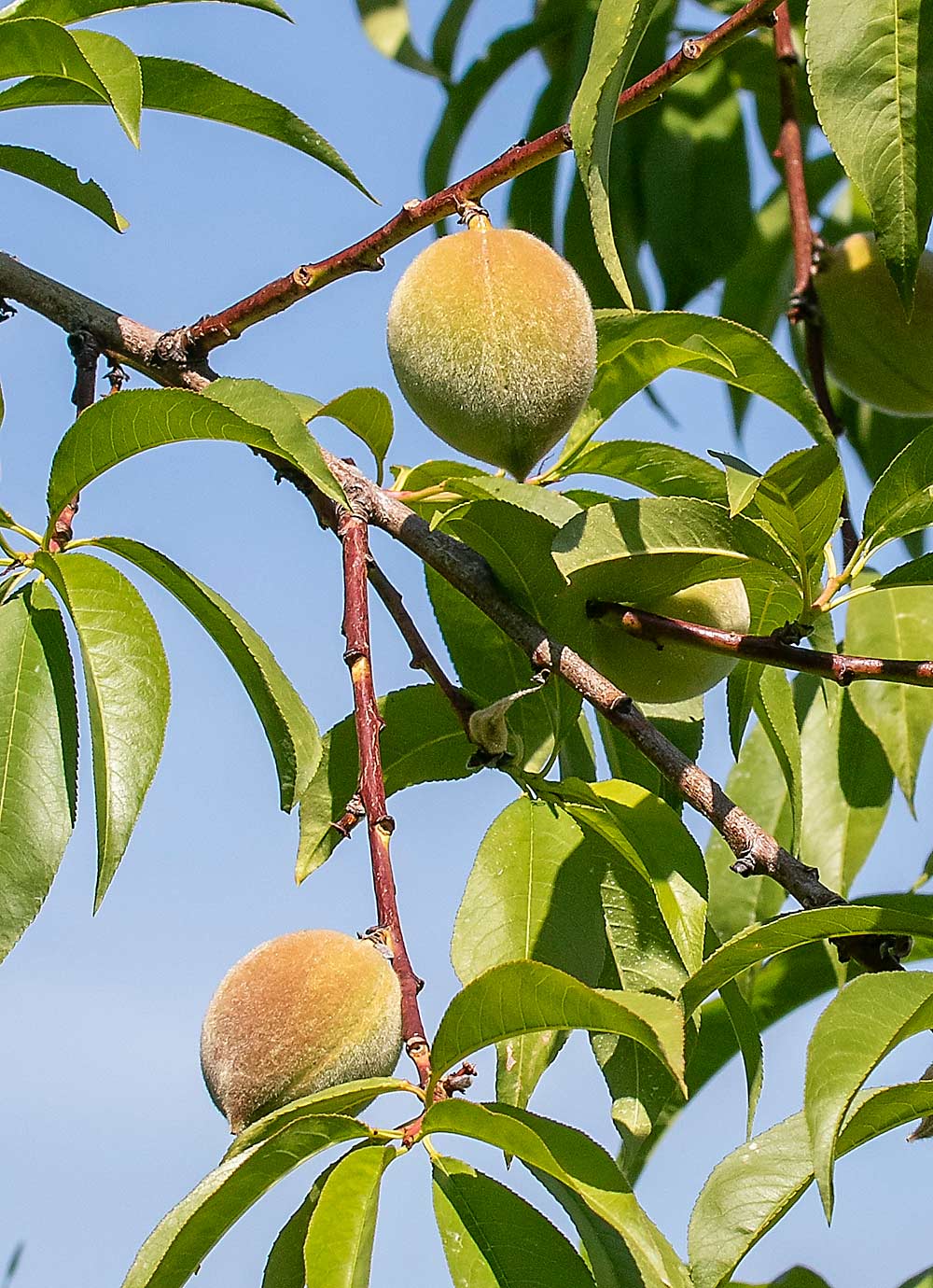—story and photo by Matt Milkovich
—photo by TJ Mullinax

Midwestern peach growers face plenty of sales competition from other regions, but large markets and demand for local produce still give them a competitive edge.
“A fresh peach is the best peach,” said Illinois farm marketer Chris Eckert. “The closer you get to the tree, the better it tastes. That’s why it’s still a product that drives consumer demand.”
Marketing and sales were among the topics discussed during the Michigan Spring Peach Meeting in March, held at Michigan State University’s Southwest Michigan Research and Extension Center in Benton Harbor.
Direct-market sales anchor the business model of Eckert’s, a retail and farm market operation based in southern Illinois, just outside St. Louis, Missouri. Fresh peaches are one of their big sales drivers.
“People will get in their car and drive to Eckert’s just to get homegrown peaches,” Eckert said.
They’ll pay a premium for them, too, especially U-pick peaches.
“Nothing beats the pick-your-own price,” he said. “It’s by far the best way to sell peaches.”
But with 300 acres of peaches, they can’t sell all of them out the front door. About 80 percent of Eckert’s peaches are sold on the fresh wholesale market, which is not as predictable as direct sales.
Peach producers in Illinois, Michigan and other Midwest states grapple with growers from competing regions throughout the season. California stone fruit is ubiquitous in the nation’s produce departments, but California yellow-flesh peaches don’t really excite consumers and struggle to sell, Eckert said. A bigger problem is Southeast peaches, mostly from South Carolina and Georgia, which typically hit the market in early July. Colorado peaches have become a bigger player, too, filling markets west of Missouri in late July.
Changing weather patterns and warmer winters have made Southeast peach yields less predictable in the past few years.
Spring freezes in 2023 led to significant peach losses in the Southeast, said Ross Williams, chief operating officer of Titan Farms, a peach grower, packer and shipper based in South Carolina. Williams gave his presentation remotely.
To adjust to “one of the worst yields we’ve had,” he said, Titan Farms focused on supplying only its top 10 retailers.

Despite the crop struggles last season, Williams said he still sees a “positive opportunity for peaches.”
“We need to focus on proper harvest maturity and postharvest quality so we can drive repeat consumers,” he said.
Eckert said the fresh peach sales window is fairly short, and any disruption can disrupt prices for everybody. If South Carolina and Georgia miss their Fourth of July marketing window, truckloads of peaches flood the market later in the month, depressing prices.
Southern Illinois growers typically start harvesting peaches right after the Fourth of July, which gives them a bit of leeway before Colorado and Michigan peaches enter the market a few weeks later. By mid-August, “customer fatigue” has set in, and demand for stone fruit wanes as customers start thinking about fall and apples, Eckert said.
Eckert’s is an important supplier of local produce for regional grocery chain Schnucks, which sells an “enormous amount” of the farm market’s peaches, he said.
“When we don’t have a peach crop, their entire produce sales go down,” Eckert said. “We’re driving traffic into their stores. That’s the power you have as a local grower for these retail chains.”
Grocery stores want more than just produce from their local suppliers. They want branding, packaging and other ways to tell their story. They also like to lock in prices before harvest. Eckert’s makes price commitments for about 75 percent of its wholesale peaches weeks before the season starts, and they let the rest “float, so we’re not overcommitted,” Eckert said.
To eliminate fruit waste and extend the peach season, Eckert’s sells peach cider, a blend of peach juice and apple cider. Schnucks stores display the peach cider next to Eckert’s fresh peaches.
“We’re able to market almost all of our waste product through cider,” he said. “You’re not going to get rich off peach cider, because it’s a lot of work to make and it’s not a super-high-value product, but it’s another way to differentiate your brand, expand your presence in the market and become more important to your retail partner.”
Eckert said Michigan peach growers have a foot in the door in two large markets: Detroit and Chicago. Even though his farm market and the Windy City are in the same state, Chicago is mostly outside Eckert’s sales radius.
Kevin Lenhart, a produce buyer at Bill’s Produce in Griffith, Indiana, said the produce supplier promotes Michigan peaches as “homegrown” in its northwest Indiana and suburban Chicago markets.
“Chicago doesn’t think of Illinois as their homegrown peach supply,” Eckert said. “They think of Michigan.” •







Leave A Comment